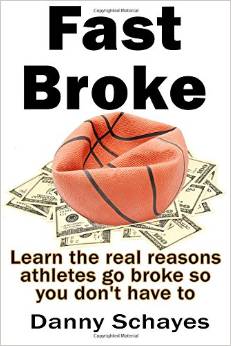 It’s In No One’s Interest That You Get It.
It’s In No One’s Interest That You Get It.
All players entering the NBA participate in the Rookie Transition Program. The league and the players association require every new player to attend a weeklong training session before the season starts. The program is an intense immersion type experience designed to open player’s eyes to NBA life.
All kinds of lifestyle topics are covered. They cover wealth and investing. They cover health. They cover sex education, drug education and other topics players need to be aware of before entering this crazy universe of pro sports. It was held in Orlando where I was playing at the time, so I was invited by the Players Association to come in as a “coach” for one of the groups of incoming rookies.
My group had 15 young players who had been drafted or were going to a team’s training camp. There were almost 100 players in all. I would attend the seminar lectures with the players, manage their educational materials, and at the end of the event open up some time for Q&A to make sure that they got all of their questions answered. What did they want to know that either wasn’t addressed or confused them?
 The players had to absorb a tremendous amount of specific information in a short period of time. As the young guys started asking questions it became obvious there were some basic big picture issues that they hadn’t picked up.
The players had to absorb a tremendous amount of specific information in a short period of time. As the young guys started asking questions it became obvious there were some basic big picture issues that they hadn’t picked up.
I started having some realizations.
I asked my group to do an exercise: Write down all the people you are going to have any kind of a financial transaction with in your pro life. We started on the white board. We picked out about 30 different people. You had the car salesman and the realtor. You had your agent and your family. You had the jeweler. You had your buddies. You had the life insurance guy. You had the stockbroker. You even had baby mamas, although they weren’t called that back at the time.
This list went on and on, and we grouped them into three categories:
1) People trying to sell you stuff: the car guy, the suit guy, the jeweler, etc.
2) The advisors: The accountant, the realtor, the insurance agent, the stockbroker, etc.
3) The people you support: your family, your friends, etc.
We started by saying, “Let’s see how many people on this list are incentivized by you having more money after you’ve dealt with them than when you started.” In other words, how many guys get paid by you making money rather than spending money?
We just started at the top. Car guy? No. Tailor? No. Jeweler? Hell no.
We quickly crossed all of those people off the list. It was immediately obvious that they wanted to sell you as much as they could without regard to what you actually needed.
Next up were the “advisors.”
What about your agent? He cares for you, right? Maybe, but remember once you’re done playing ball, he’s done representing you. He doesn’t make any more money. His game is simple. The union has capped his fees for negotiating your contract at 4 percent of the gross salary. The day you sign the deal, you owe him that for the entire life of the contract. He doesn’t ever need to speak to you again.
But he knows that you want him to do all kinds of things for you. So he sets up a service division. He wants to provide as many services you will pay for while you are an active player. He can charge extra fees for bill paying, tax preparation, house hunting, offseason travel arrangements, car purchases and anything else that you will pay him to do.
The vast majority of these things you can do yourself, but he will try to convince you that you should just worry about basketball and leave the rest to him. Plus, investing is too complicated, so he will handle that for you as well. Imagine the fee stream that’s possible in this deal.
What about your real estate agent? After all, your house is your biggest asset, right? Let’s think about that. Their commission is determined by how much house you buy, so they want you to buy as big a house as you can qualify for – not one that is a sensible fit for you and your family. Maybe a $1 million house is best for you financially, but you can qualify for a $4 million house.
They want you to buy the $4 million house, even though you could go broke keeping up with the payments. And what if you get traded in two years? They get to sell it again. So they’re not on your side.
We continued down the list. We even discussed people who you think would want to make money for you. What about your stockbroker or insurance agent? Do you pay them on commission or performance? Virtually all stockbrokers get paid on commission, because stockbrokers on that level know that you don’t know what you’re doing. So they just churn your account. That way they can pretend they are actively investing your money. Insurance products pay massive commissions. Do you think they explain that as accredited investors you can buy the exact same products with no commission? Have you ever heard of private placement life insurance? I doubt it.
The reality is that top quality advisors don’t want “dumb money” because it’s too much work. The good ones get plenty of business and don’t want the headaches that come with working with unsophisticated clients. Why bother? The scam artists know what lies to tell to get your business. They usually chase the good ones away.
What about your family? They want you to save money, right? Do they? What if by learning what you should really do, you figure out that you wouldn’t be supporting all these people, or to the level that you do? They don’t want you to know better than that. They want you to give them all your money, so they didn’t count.
I was counseling one player who made big money before going broke. He said to me the most dangerous thing I ever heard. He told me that he loved his mother so much he would give her his last dime. I thought about that and asked, “Do you really hate her that much?” He was shocked when I explained how painful it would be for her to raise you from poverty to financial freedom, only to lose it all and return to poverty. If you spent half of what you do on her now, she could live well forever. She had guilted him into giving her all of what the super wealthy player moms got. Only he couldn’t sustain it and finally did give her his last dime. I bet that didn’t feel very good after all.
We ultimately figured out that there isn’t one person on the list who is motivated by a player being successful. They are motivated only by a player giving them some of their money. That was probably the biggest eye-opener for young players. Just doing that exercise made me realize how rigged the system truly is.
Purchase a copy of Fast Broke from Amazon.com for $14.95.
Danny Schayes is a Director of Business Optimization at Intensity and a leader in the business of professional sports. Schayes frequently advises sports organizations in complex business matters that include contract negotiations, pricing strategy, marketing optimization, and executive leadership. Follow him on Twitter.
EXCERPT I: WHY PLAYERS GO BROKE
EXCERPT II: SMART MONEY VS. DUMB MONEY
MORE COLUMNS FROM DANNY SCHAYES:
FORGET MVP: THESE AWARDS ARE BETTER
WATCHING FRANK KAMINSKY WAS LIKE LOOKING IN THE MIRROR
HOW DANNY SCHAYES RUINED PATRICK EWING POSTER NIGHT
NO SMOOTHING MEANS $90 MILLION SALARY CAP, FISCAL INSANITY
DIVORCE COURT FOR COACHES AND PLAYERS: A MAGIC JOHNSON COACHING TALE
NBA’S PIONEERS DWINDLING FOLLOWING DEATH OF EARL LLOYD